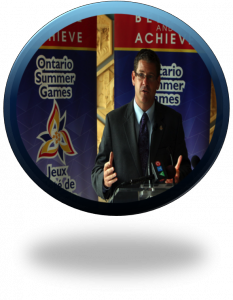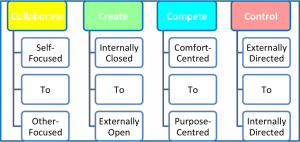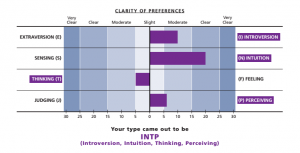Mike Chantler
An Authentic Leader
Community Champion
Mike Chantler goes above and beyond what is expected of him to benefit his community. He is currently the general manager of the new Windsor International Aquatic and Training Center. He leads from the heart to build motivated teams. Through is pure and authentic energy, he is able to inspire others to work toward a stronger community.
“I would never ask an employee to do a job I wouldn’t do myself. I’ve spent a fair amount of time serving fries and hamburgers.”
Background
Mike Chantler was born in Kelowna, British Columbia, but he has spent most of his life in Windsor, Ontario. He attended the University of Guelph to study microbiology, and transferred to the University of Windsor. He was interested in joining the police force, so he also took courses in criminal justice and criminology. During his program, he grew an appreciation for law, so he also took some law courses. Throughout university, Mike worked full time, and at some point built a home and got married. He graduated with a Bachelor of Arts.
Mike started working at 13 years of age as a dishwasher. Eventually he moved from being a dishwasher to working as a busboy, and then became a waiter within 4 years. Mike worked in the hotel and restaurant industries before taking a job in the healthcare industry. Then he worked for the tourism board in Windsor. During his time at the tourism board, Mike received his Business Skills certificated from the University of Windsor. Mike changed course again when he became the deputy licensing commissioner for the City of Windsor. Mike has acknowledged that, as a City of Windsor employee, an individual’s role varies every day. Mike Chantler is more well-known in Windsor for his recent role as general manager of the 2014 Ontario Summer Games.
Diving in Head First
When touring the Windsor International Aquatic and Training Centre, Mike Chantler told a story of how he took a leap of faith off of the high dive. Throughout his educational and professional career, Mike has truly displayed his versatility in what he does and his commitment to “diving in head first” with whatever it is that he is involved in. Whether it is managing the Ontario Summer Games, operating the International Aquatic and Training centre, or coaching his daughter’s soccer team, Mr. Chantler is 100% involved and engaged. To be able to do a complete 180 in roles and have the belief in yourself to succeed as well as the passion for what you do is truly remarkable, and that is exactly what Mike Chantler has done, and will continue to do. To rashly put all your effort into something without thinking of consequences or reward takes courage. Hitting that level of self-realization is what each and every one of us should strive for, and unequivocally depicts what being a Community Champion is about.
First Impression
After analyzing available information online, our team believed that Mike Chantler would tend toward the Control quadrant of the Competing Values Framework (CVF). We believed that he was most
comfortable assuming Coordinator and Director roles, because of his past professional background. For instance, he was the manager of 2014 Ontario Summer Games. In this role, he faced tremendous challenges. For one, he faced a very tight timeline (he only had 6 months to prepare compared to the usually allotted 1 year or more).
A ‘Coordinator’ generally maintains structure, schedules, organizes, and coordinates staff efforts. We made a fairly straightforward deduction from what he was tasked to do during the preparation of the Ontario Summer Games, that he would have been a coordinator. Mike overcame many logistical challenges during the Ontario Summer Games, so we inferred that he must be a strong, confident, independent leader. We also inferred that he would be assertive, responsible, and self-disciplined. For this reason, we argued that he would work within the ‘control’ and ‘compete’ quadrants of the CVF. By this, we assumed he would be strong in executing and influencing.
New and Improved CVP
After sitting down and speaking to Mike, we gained a better sense of how he operates and what makes him tick. He tends to surround himself with those who complement his skill-set and who he can connect with on a deeper level than simply a colleague. Many of the individuals Mike does business with are life-long friends, and regardless of the work environment he is in, he strives to create an enduring familial culture. Thus, we can infer that Mike habitually operated in the Collaboration quadrant by the CVF. Mike often leads and manages in Innovator and Producer roles. Mike has this contagious energy and upbeat personality that trickles throughout everyone he works with. His ability to inspire the people around him to adopt this energy is key to his authentic leadership. Innovators are typically adaptive, flexible, open, and humble. Mike’s ability to adapt is world class, but beyond that he is humble. Perhaps the most distinguishable characteristic he holds is his kind heart and his true caring for others. This was unintentionally revealed during our visit to the Aquatic Centre. As we were touring the facilities, we walked through a doorway and Mike stopped, looking puzzled. He realized that this door did not have an automatic handicap door opener. He noticed this minor detail that so many others missed (including us). Mike was instantly concerned and frustrated. Something that so many others overlooked was so clear to Mike; this is truly a testament to his caring personality.
New & Improved Strengths
Mike Chantler deeply understands his own strengths and he seeks out the strengths of the people around him. He has a gift for figuring out how people can work together productively. This is one reason
for the success of the Ontario Summer Games. Another reason lies in Chantler’s stamina; he is incredibly driven and works very hard, two qualities that describe an achiever. Moreover, he is an authentic communicator. He does not hesitate to put his thoughts and his vision into words.
One of Mike Chantler’s strengths is particularly obvious in assessing his professional and academic background; that is, he is adaptable. His skills transfer from one professional practice to another. He sees tremendous value in the skills he acquired in the hospitality industry. He reads people and shapes appropriate responses to optimize conversations and outcomes. His most influential strength is his energy; it is so pure and authentic. His positive energy permeates everything that he does and says, and it transfers to the people around him. This is how he builds up his team. He encourages others to have a vision.
Fundamental State of Leadership
Mike Chantler is not normal. Actually, by Robert Quinn’s concept of the Fundamental State of Leadership, he has transcended the typical individual’s normal state of functioning. He is not self-focused or ego-driven; rather he acts for the greater good of the people around him. When Mr. Chantler was approached by the mayor of Windsor and asked to take on the Ontario Summer Games (set to occur in a mere 6 months), he did not accept with a view of adding another impressive line on his resume. He accepted the role for the greater good of the Windsor community; he saw a chance to showcase and engage his community. He accepted this position knowing that it would be extremely challenging, and that he had no prior experience with organizing events of this scale. He does not restrict himself to the proverbial ‘comfortable box’; to the contrary, Mike Chantler eagerly embraces change. He does not keep a job for more than five years. This does not signify that he is impatient or has a short attention span; quite the opposite, he sees change as an opportunity to grow. He readily experiments by taking on new and different roles and adapting to new environments. By adapting to new roles and people, Mike Chantler has been able to reach a level of self-discovery and awareness not reached by many people. This is also a testament to his ever-willingness to actively learn from the people who surround him.
Mike Chantler does not live in a reactive state; he is committed and engaged, and actively seeks opportunities. He can certainly react to problems, but he does not get lost in this state. He also looks to others to make the most of whatever project is at hand. He plays to the strengths of his team to execute tasks that he admittedly could not accomplish alone. Rather than waste time trying to coordinate
transportation for thousands of athletes and their families around the Windsor-Essex area during the Summer Games, Mike appointed someone who was intimately acquainted with Windsor’s transit system to the task.
He does not define himself by others’ expectations or assessments. He is comfortable with who he is, and leads a purposeful life, but not in the sense that he is goal-oriented and hardworking; rather he acknowledges the need to close the gaps between his actions and his values. His first thought upon considering whether to accept the Summer Games’ position was that, by accepting the position, he would have to break a promise he had made to his daughter; he had promised that he would coach her soccer team that upcoming summer. He then made it a point to never make promises that he couldn’t keep.
Authentic Leadership
To be an effective leader, an individual must invest in their strengths, surround themselves with the right people to maximize their team, and understand their followers’ needs. To be an authentic leader, an individual must profoundly understand themselves and the people around them. Mike Chantler is an authentic leader. He understands and leverages his own strengths and he actively seeks out the strengths of others to enhance projects. He plainly and willingly speaks the truth. When he speaks, it is not do make his voice heard – he speaks to get his message across. His energy is pure and authentic. After meeting with him for one hour, anyone would walk away knowing that Mike Chantler genuinely enjoys his life. He surrounds himself with good, complimentary people that share the same kind of positive attitude.
Chantler leads from his heart, with the aim of improving Windsor. He does this by leading through people. This is only possible because he leads by example. By this, he builds effective teams; furthermore, he has been able to build the Windsor community. At the end of the day, Chantler acknowledges that his job is not finished. There’s always something that needs to be done or changed for the better.
Astonishingly, Mike Chantler does not strive for perfection. He knows that problems or glitches are inevitable, so instead of reprimanding his team, he acknowledges his team’s ability to contend with these issues. This is perhaps the core of his authentic leadership; it really illustrates Mike’s appreciation for the people around him.
Lessons Learned
A true community champion goes above and beyond what is expected of them to benefit those around them. Mike is the first to admit the necessity of being surrounded by good people in order to be a successful leader, and that a sense of community needs to be created in any type of team in order for it to be successful. Mike jokingly described his leadership: “I’m a tyrant, I rule with an iron fist”; but he truly understands that success is a team effort, and his role is to inspire and lead by example. “I would never ask an employee to do a job I wouldn’t do myself, I’ve spent a fair amount of time serving fries and hamburgers as well”; here Mike refers to his role as general manager at the Windsor International Aquatic and Training Center. Mike is truly an inspirational leader; he immerses himself entirely in to any role given to him, and sacrifices his personal gains for the sake of the team around him. With that being said, he also exemplifies the importance of a work-life balance; he is as heavily involved with his family activities as he is with his work. Anyone would get the impression that his friends and family are the driving force behind his success. To round off this tribute to Mike Chantler’s authentic and champion leadership, we’ll end with a quote by Gary David Goldberg: “It takes a lot of people to make a winning team. Everybody’s contribution is important.”










